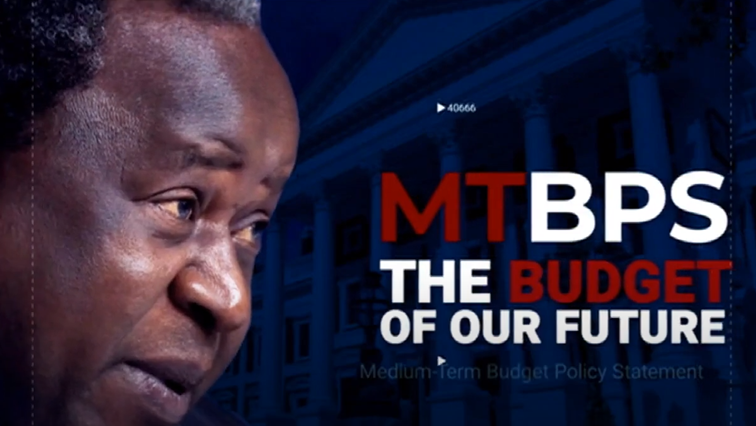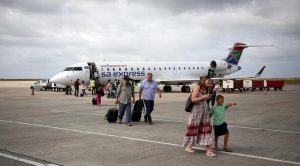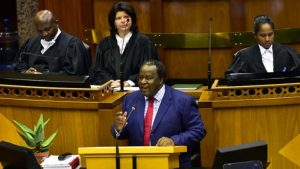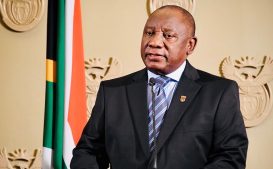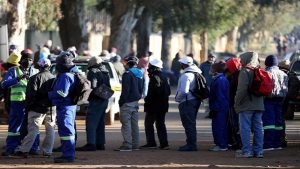Finance Minister Tito Mboweni on Wednesday presents his Medium-Term Budget Policy Statement (MTBPS) in the National Assembly.
Mid-Term Budget Policy Statement is an opportunity for the National Treasury to revise fiscal plans for fiscal consolidation.
Mid-Term Budget YouTube playlist:
Midterm budget to address government’s plans to boost falling revenue
The Medium-Term Budget Policy Statement to be delivered by Finance Minister Tito Mboweni Wednesday afternoon is expected to shed light on how the government plans to boost falling revenue.
South Africa’s low economic growth coupled with the impact of COVID-19 has reduced the country’s earnings in taxes and duties.
Mboweni will also announce new measures to tighten spending cuts.
The Finance Minister is expected to use the budget to intensify his call for the government to rein in spending related to high salary bill, wasteful expenditure and the on-going support to SOEs. This is to address a widening gap between revenue and expenditure.
Market analyst Liston Mentjies says Mboweni is likely to use the budget to signal more tax hikes in the future. “The potential to change VAT is enormous that might have been a sticking point with a lot of ppl saying we can’t afford it. If you put VAT at 20% that will be a shocker, but then we will exempt more products. People normally stop spending after VAT increase.”
The impact of COVID-19 19 on the economy has forced the government to find additional resources to support the ailing economy.
President Cyril Ramaphosa announced a R500 billion relief package in April to soften the economic blow of the pandemic on the economy.
The full benefit of the relief package is still to be realised. That’s with some of the expenditure related to COVID-19 19 mired in corruption.
Economic reconstruction and recovery plan
On 15 October 2020, President Ramaphosa addressed the joint sitting of Parliament on South Africa’s Economic Reconstruction and Recovery Plan. It brings together the work of government departments, the Economic Recovery Action Plan agreed by social partners at NEDLAC and contributions from the Presidential Economic Advisory Council.
The President said the plan comprises of a bold vision and immediate actions to build a new economy. He said the new economy is an economy where there is dignified work for everyone, abundant energy and modern infrastructure, social protection for those in need, and where growth is inclusive, digital, green and sustainable.
President Cyril Ramaphosa presents SA’s Economic Recovery Plan:
According to the government, the plan is about implementation and accountability and prioritises actions with the highest impact to restore economic growth.
In the eyes of the international investor community, Mboweni will be judged on his ability to stick to his guns when it comes to his proposed plans to lower debt to GDP and his approach to narrow fiscal deficit.
South Africa’s economy is projected to contract this year by more than 7% further compounding the burden of low growth.
In a supplementary budget tabled in response to the coronavirus crisis, the Treasury projected the main budget deficit would widen to 14.6% of GDP in the current 2020/21 fiscal year.
The Treasury projected that gross government debt would rise to 81.8% of GDP in 2020/21 from 63.5% last year.
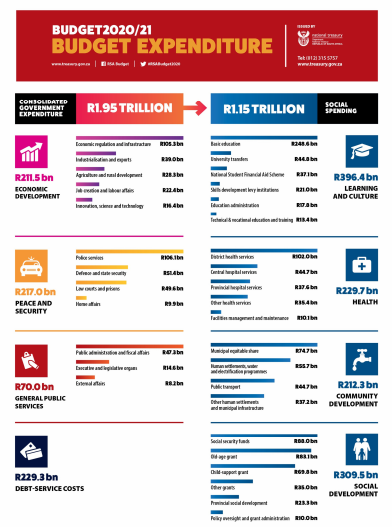
Massive rollout of infrastructure
To finance infrastructure at the scale required, the government will work with the private sector to deliver priority infrastructure projects.
The Infrastructure Fund will provide R100 billion in blended finance over the next decade, leveraging as much as R1 trillion in new investment for strategic infrastructure projects.
The government said it will resolve those policy constraints that hamper infrastructure development. The current procurement framework, as well as the regulatory framework for public-private partnerships under the PFMA and MFMA, will be reviewed to enable effective delivery.
Unlocking over R1 trillion in new infrastructure investments through enabling the private sector, building capability in Infrastructure SA and the Infrastructure Fund, reviewing procurement frameworks, and providing catalytic funding through blended finance instruments. –Reporting by Tshepo Mongoai and Velemseni Mthiyane
SMMEs in the Eastern Cape buckling under COVID-19: Nomkhita Mona
SMEs hope to get clarity on recovery plan
SABC News’ Liabo Setho reports that as the Finance Minister puts final touches on his medium-term budget policy statement, small businesses are hoping to get clarity about initiatives to support them.
Earlier this month, President Ramaphosa announced the Economic Reconstruction and Recovery Plan which they say lacks necessary detail in terms of initiatives to support SMEs.
Small businesses play a pivotal role in the growth of the economy and they too took a hit from the impact of the covid-19 pandemic. But according to Jeremy Lang, regional general manager at Business Partners Limited, the economic recovery plan lacked detail about the sector will be supported
Lang says SMEs need Wednesday’s budget to prioritise their needs. This includes reliable energy supply which is central to economic development.
Other items on the wish list include the provision of finance and technical assistance to SMEs. On the topic of infrastructure spend and roll-out plans, Lang believes there is a need for purposeful initiatives to subcontract to SMEs. He also hopes to see a special dispensation for SMEs in the Government’s employment tax incentive scheme.
And a finally a solution to the late payment, particularly from government saying there should be effective processing of payments to SMEs
Economist Owen Nkomo on the 2020 Medium-Term Budget Policy Statement:


